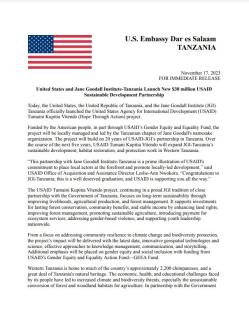Today, the United States, the United Republic of Tanzania, and the Jane Goodall Institute (JGI) Tanzania officially launched the United States Agency for International Development (USAID) Tumaini Kupitia Vitendo (Hope Through Action) project.
Funded by the American people, in part through USAID’s Gender Equity and Equality Fund, the project will be locally managed and led by the Tanzanian chapter of Jane Goodall's namesake organization. The project will build on 20 years of USAID-JGI’s partnership in Tanzania. Over the course of the next five years, USAID Tumani Kupitia Vitendo will expand JGI-Tanzania’s sustainable development, habitat restoration, and protection work in Western Tanzania.
“This partnership with Jane Goodall Institute-Tanzania is a prime illustration of USAID's commitment to place local actors at the forefront and promote locally-led development,” said USAID Office of Acquisition and Assistance Director Leslie-Ann Nwokora. “Congratulations to JGI-Tanzania; this is a well deserved graduation, and USAID is supporting you all the way.”
The USAID Tumaini Kupitia Vitendo project, continuing in a proud JGI tradition of close partnership with the Government of Tanzania, focuses on long-term sustainability through improving livelihoods, agricultural production, and forest management. It supports investments for lasting forest conservation, community benefits, and stable income by enhancing land rights, improving forest management, promoting sustainable agriculture, introducing payment for ecosystem services, addressing gender-based violence, and supporting youth leadership nationwide.
From a focus on addressing community resilience to climate change and biodiversity protection, the project’s impact will be delivered with the latest data, innovative geospatial technologies and science, effective approaches to knowledge management, communication, and storytelling. Additional emphasis will be placed on gender equity and social inclusion with funding from USAID’s Gender Equity and Equality Action Fund—GEEA Fund.
Western Tanzania is home to much of the country’s approximately 2,200 chimpanzees, and a great deal of Tanzania's natural heritage. The economic, health, and educational challenges faced by its people have led to increased climate and biodiversity threats, especially the unsustainable conversion of forest and woodland habitats for agriculture. In partnership with the Government of Tanzania, the USAID Tumani Kupitia Vitendo (Hope Through Action) project is committed to addressing these challenges.
For more information about this press release, please contact the U.S. Embassy Tanzania Press Office at DPO@state.gov.

